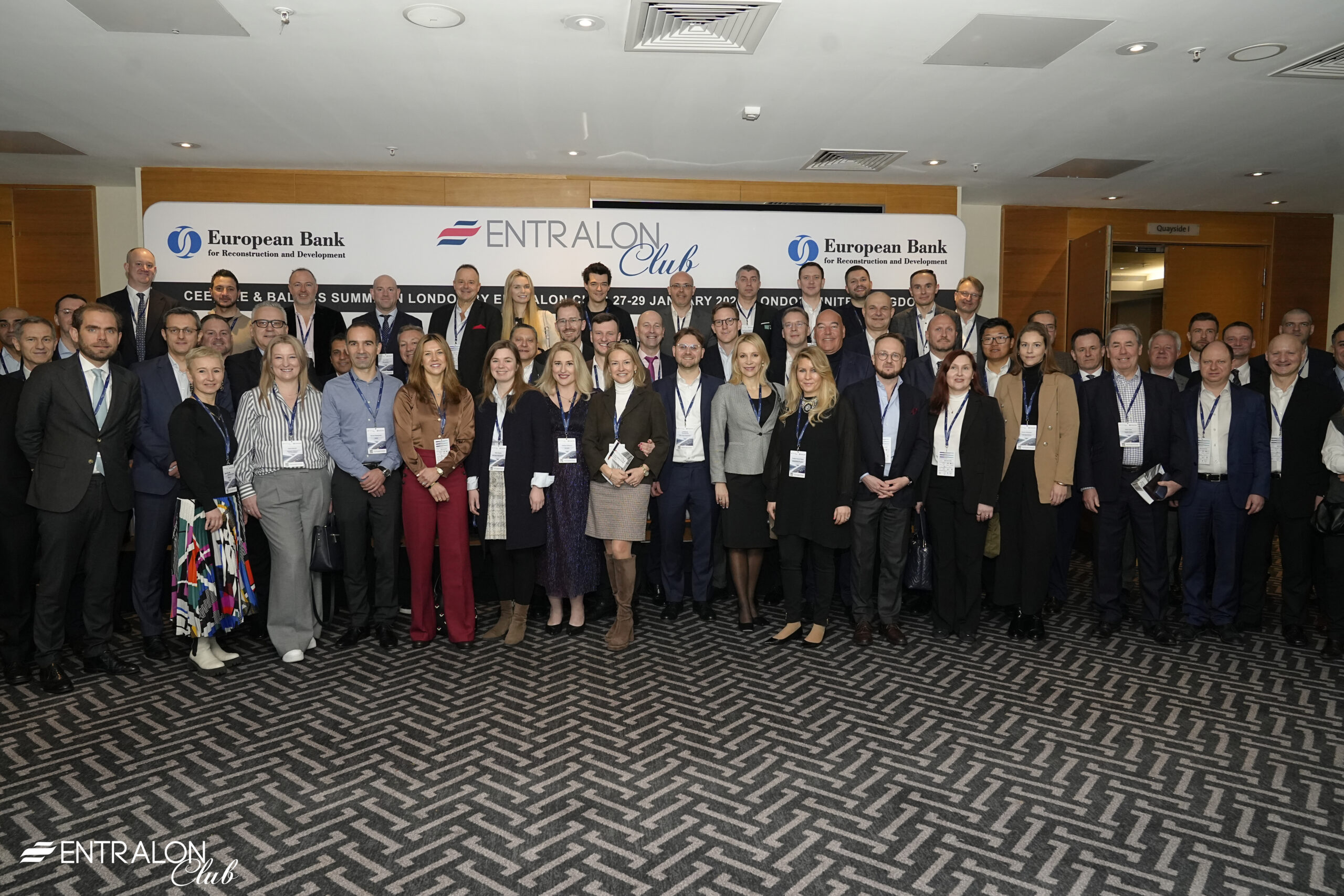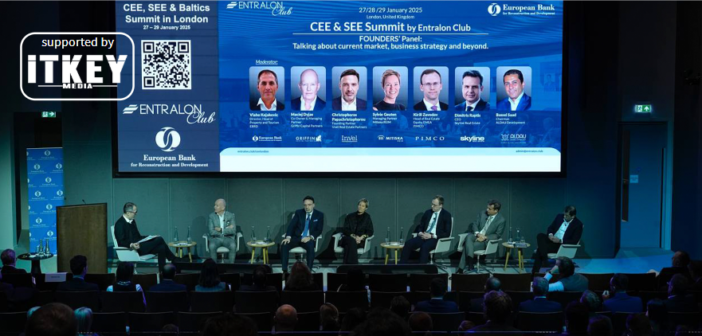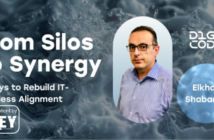- Entalon Club’s CEE, SEE & Baltics Summit 2025 hosted 175 professionals from 21 countries, discussing ongoing and expected trends and risks in real estate
- Key Topics included investment shifts, ESG impact, AI in real estate, and logistics sector sustainability
- In particular, it was highlighted how AI and Blockchain enhance efficiency, transparency, valuation, predictive maintenance, and transaction security
- Next year’s Summit plans broader discussions, including AI adoption challenges and ways to improve gender diversity in PropTech
On January 27-29th, Entralon’s second annual CEE, SEE & Baltics Summit 2025, held in London, brought together 175 industry professionals from 21 countries to discuss emerging trends and risks in real estate.
Summit Summary
The event highlighted the unique opportunities in the EBRD regions, with a focus on macroeconomic outlooks, including challenges like rising interest rates and inflation. Key discussions explored investment trends, with a notable shift in capital allocation, especially towards CEE, and the impact of green credentials and ESG in real estate.

The logistics and industrial real estate landscape in Central Europe was also examined, emphasizing the importance of sustainability and decarbonization strategies. AI’s growing role in real estate was another key theme, where transparency and efficiency were improved, although challenges around data accuracy and resistance were acknowledged.
Investment in sectors such as the Private Rented Sector (PRS) and student housing was recognized as promising, though barriers like development costs and regulatory hurdles were discussed. The event also covered ESG and financing strategies, emphasizing green buildings’ growing importance in real estate transactions. Retail investment showed resilience, with growth expected in CEE due to stable consumer demand and a shift towards omnichannel strategies.
Overall, the summit emphasized market maturity, sustainability, and the integration of innovative technologies in real estate development.
ITKeyMedia approached the Summit’s organizers, Entralon Club’s founder Svetlana Fedosova and Entralon Group’s founder and CEO Dr Farid Bagheri, to find out how happy they are with the event, what may have been left out of the Summit’s tightly packed agenda, and what we might expect next year.
Overall, can you say that you are perfectly happy with the way the Summit turned out, or do you feel like you could do more? Perhaps you realized on the go that some topics deserved more highlighting?
 Svetlana Fedosova: We are very pleased with the outcome of this year’s Summit, particularly with the highly positive feedback we received from participants. One of the key achievements was the expansion of our geographic reach, bringing together professionals from 21 countries. Additionally, we were able to attract a high level of seniority, with key decision-makers from pan-European funds actively participating in discussions.
Svetlana Fedosova: We are very pleased with the outcome of this year’s Summit, particularly with the highly positive feedback we received from participants. One of the key achievements was the expansion of our geographic reach, bringing together professionals from 21 countries. Additionally, we were able to attract a high level of seniority, with key decision-makers from pan-European funds actively participating in discussions.
Our agenda was well-structured, covering the most relevant and timely topics, which resulted in dynamic and engaging conversations. The event brought together 175 top industry professionals who explored the latest trends and risks shaping the real estate sector across the represented markets and beyond. While we are satisfied with the overall execution, we always strive for improvement and take note of areas where we can enhance the experience even further in the future.
How do technological disruptions like AI and crypto reshape real estate investment? What is the nature and scope of this reshaping?
Dr Farid Bagheri: AI has enhanced the power of market analysis and valuation. Both AI and blockchain (crypto) are increasing efficiency (e.g. with faster money transaction), transparency and accessibility. Whilst AI has enhanced market analysis as well as improving risk assessments, crypto has enabled a safer process of transaction as well as putting into place smarter contracts. All together, they reduce transaction costs as well as allowing more global investors to invest their money more widely around the world.
How different is the role of AI in different real estate sectors (commercial, residential, industrial, etc.)?
FB: In commercial real estate, not only does AI enhance lease pricing, it can also predict any maintenance that needs to be done. On the other hand, in residential real estate, AI improves home valuation, refines property searches via personalised algorithms, as well as providing virtual tours created via immersive experiences. Industrial real estate utilizes AI for logistics, warehouse optimization as well as any predictive maintenance. The effectiveness of AI relies heavily on data quality and availability.
How different is the role of AI in different real estate sectors (commercial, residential, industrial, etc.)?
 FB: In commercial real estate, not only does AI enhance lease pricing, it can also predict any maintenance that needs to be done. On the other hand, in residential real estate, AI improves home valuation, refines property searches via personalised algorithms, as well as providing virtual tours created via immersive experiences. Industrial real estate utilizes AI for logistics, warehouse optimization as well as any predictive maintenance. The effectiveness of AI relies heavily on data quality and availability.
FB: In commercial real estate, not only does AI enhance lease pricing, it can also predict any maintenance that needs to be done. On the other hand, in residential real estate, AI improves home valuation, refines property searches via personalised algorithms, as well as providing virtual tours created via immersive experiences. Industrial real estate utilizes AI for logistics, warehouse optimization as well as any predictive maintenance. The effectiveness of AI relies heavily on data quality and availability.
It was mentioned that speakers highlighted AI’s potential, urging women to adopt AI tools to remain competitive in the evolving job market. Is there any gender disbalance in AI adoption?
FB: We believe there is a gender imbalance in AI adoption. This was also mentioned on the 3rd day of the summit- Women in Real Estate. Factors which can contribute towards this can include underrepresentation of women in AI heavily fields as well as social biases. Women are underrepresented in AI development and leadership roles which can in turn lead to fewer learning opportunities.
Are there any differences between AI adoption in CEE and in other regions?
FB: The entirety of Europe is really advancing in AI adoption, however the CEE is still lagging behind compared to western Europe. The CEE is exhibiting more strength in healthcare and manufacturing whereas the western Europe possesses more established AI ecosystems as well as higher investment levels. In western europe, 30% of enterprises have integrated AI whereas in CEE only 4% have integrated AI.
Do you have any ideas you’d like to share as to how different the next Summit will be?
SF: We already have exciting ideas and enhancements in mind for the next edition of the Summit. Our team is actively working on refining the agenda to ensure it continues to address the most pressing industry topics. We plan to introduce new elements that will further enrich the discussions and create additional value for our participants. While we will share specific details in due course, we are committed to making the next Summit an even more impactful and insightful event.


Kostiantyn is a freelance writer from Crimea but based in Lviv. He loves writing about IT and high tech because those topics are always upbeat and he’s an inherent optimist!





